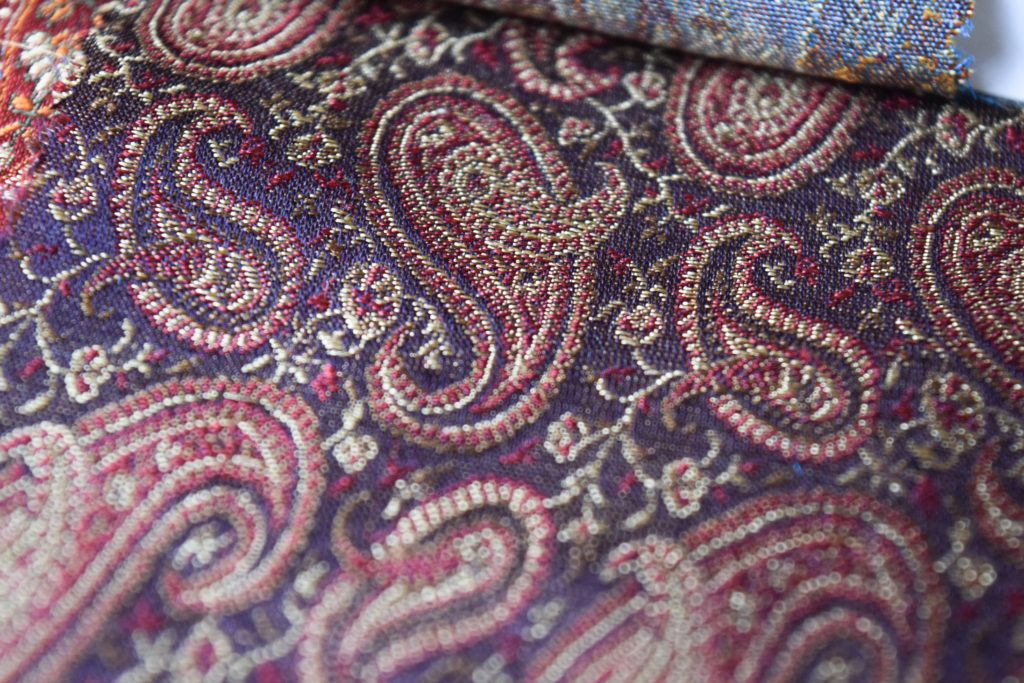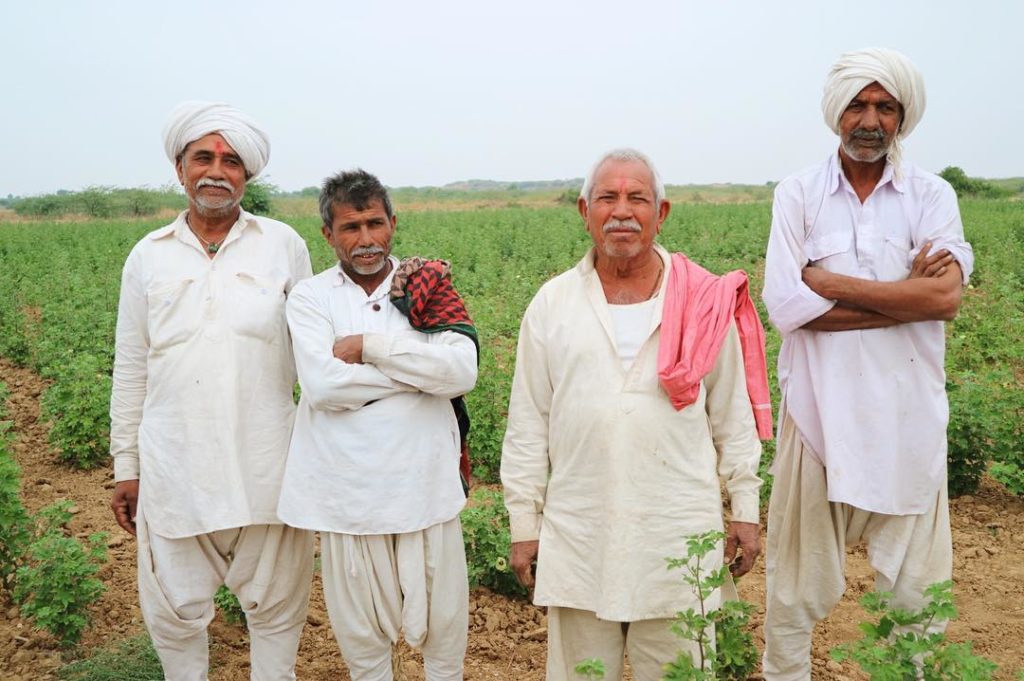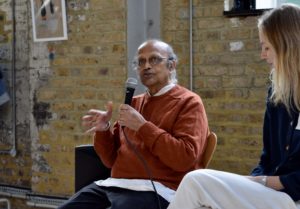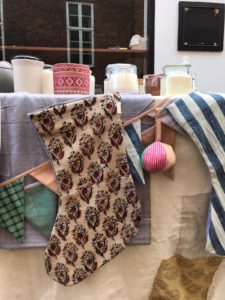Kishore Shah always had an interest in changing the world for the better. Here’s how he found the power to make an impact by starting social enterprise, Khadi London. Here is his Merchant Story.
Making a more direct impact
Kishore used to consult with governments in India over sustainability issues and was in the midst of pursuing his Masters in studying communities and religions practising non-violence and downward accountability. These were subjects that he felt very strongly about and he was intent on devoting his programme to understanding these issues in detail with plans to go one step further with a PHD after his Masters
However, in the middle of his mission, Kishore was diagnosed with cancer and had to take a sabbatical from his studies to recuperate. During his recovery and subsequent continuation of his Masters, Kishore gained a more reflective view of the people he worked with during his programme.
As part of his studies, he conducted immersive interviews with all the key stakeholders for his thesis and quickly realised the linking factors between every single person he spoke with.
He says: “When I held in-depth interviews with the impoverished communities in India, Ethiopia and various non-profit organisations during the course of my Masters, something struck me.
“Although they [the NGOs] are doing better work than most in India – a lot of them were wearing the mask of ‘sustainability’ for marketing purposes as you can get good funding through this but it did not really address key issues or solve any problems. This was truly my moment of enlightenment.
“Instead of going ahead to pursue my PhD, I decided to make a more direct impact by opening Khadi London.”
Taking The Reins of Khadi London
In 2014, Kishore incorporated Khadi London in the United Kingdom as he wanted to educate the western world about truly sustainable methods of fabric making and the principles behind khadi cotton. At the time, he noticed a gap in the market for sustainable fabrics in the UK and decided to fill it.

Handspun khadi silk fabric
“Khadi was an industry that was started by Gandhi to help unskilled Indian villagers create their own livelihoods by weaving cotton. The methods and principles behind the creation of the garments make them automatically more sustainable, eco-friendly and fair-trade. Opening Khadi London is my way of giving back to these communities to ensure they can sustain their livelihoods,” Kishore says.
His choice to incorporate this as a community interest company (CIC) in the UK was not an arbitrary one. He adds with conviction: “A CIC is a guarantee that should someone else other than me take over the company, it is assured that Khadi London will always be a social enterprise – and the communities we support are protected, in any case.”
By 2015, Kishore had set up a stall in Greenwich Market in London in a space known for retailing artisanal products. The stall sold ready-to-wear khadi cotton clothing and accessories imported from India. Sadly, Khadi London’s first foray into business-to-consumer selling was not successful due to cultural and style differences in the items. Kishore had also suffered a mini-stroke at that point, so he decided to close the stall and take a step back to recover and regroup.
However, all was not lost. Kishore noticed that small ‘slow-fashion’ designers were very keen on khadi fabrics from days at Greenwich Market. These brands included UK-based companies as Ecosophy, Henri and Pico.
Changing Up Khadi London
From his learnings, Kishore pivoted his business strategy to retailing khadi fabrics as a commodity instead to designers. Putting his previous experience to good use, Khadi London’s fabrics are hand-woven by a cooperative of community-based farmers, graziers and artisan clusters in India.

Farmer cooperative in India, supported by Khadi London
The brand currently supports about 50-100 people in the cooperative, ensuring that they are taken care of and treated fairly. It also gives women in these villages more financial independence and shines a light on gender equality in rural areas. Keeping to his promise of being truly sustainable, the entire khadi fabric manufacturing process uses up to 91 percent fewer emissions, 20 percent less water and saves up to 3.24 times more energy due to its handspun conventional production techniques.
Aside from handwoven khadi cotton, the brand has also expanded into retailing silk and wool. Through networking with like-minded professionals in the UK, Kishore has found success as a retailer of distributors instead, with regular wholesale customers that utilise Khadi London fabrics in products ranging from cushion and quilt covers to toys and clothing. These distributors also pride themselves on ethical production and true sustainability.
“At the moment, Khadi London is run by myself and a host of volunteers who truly believe in the cause and understand the importance of the issues we are trying to highlight. Seeing the passion and commitment of everyone around me from the staff in London to the communities in India spurs me on [to keep Khadi London going],” says Kishore, in spite of his health issues.
This year the brand dipped a cautious toe back into the business-to-consumer waters by retailing its own reusable and sustainable Christmas bundles comprising khadi cotton ornament, stockings, buntings and cloth wrappings, all designed and created by its volunteer staff. The items saw sales from its mini-Christmas markets in Denmark and via e-commerce in the UK.
Raising Brand Awareness Reaps Fruit
As a result of Khadi London’s constant efforts to raise awareness about the benefits of khadi cotton, the brand has now seen traction all over the world. He says happily: “Before COVID-19 hit India in January 2020, we helped organise a conference on the Globalisation of Khadi which saw the attendance of many key policymakers and other startups. This is the first time they have gotten together to discuss [this matter]. There were about 18 countries in attendance and we initiated the whole process.”
Kishore is also proud of other achievements such as the inauguration of a khadi event in the Fashion and Textile Museum in London by Gandhi’s great-grandson in 2017 and the organisation of the first Festival of Natural Fibres to raise awareness in the UK about plastics in textiles.

Aside from producing in India, Khadi London also has a cluster of locally produced fabrics in Cornwall, a flax growing area in the UK. “I aim to consistently educate the public about the importance of true sustainability and ensure that my actions have a lasting impact in the world,” Kishore says with renewed determination.
…
Kishore Shah founded Khadi London. Accessories and fabrics are available on their online store.
Merchant Stories: Real entrepreneur stories from real people. If you’d like to share your merchant stories, email us.




